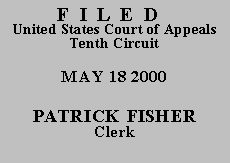

| UNITED STATES OF AMERICA
Respondent - Appellee, v. DAVID L. TOBLER Petitioner - Appellant. |
No. 99-8103
(D.C. No. 98-CV-188) |
In 1986, Tobler pleaded guilty to aiding and abetting the distribution of cocaine in violation of 18 U.S.C. § 2 and 21 U.S.C. § 841(a)(1) and was sentenced to eight years imprisonment followed by three years of special parole. On July 27, 1998, he filed a motion to vacate, set aside, or correct his sentence pursuant to 28 U.S.C. § 2255 in United States District Court for the District of Wyoming. That motion was denied on November 8, 1999, and this application for COA followed.
On April 24, 1996, the Antiterrorism and Effective Death Penalty Act of 1996 ("AEDPA") became effective, including the provision subjecting § 2255 motions to a one-year statute of limitations:
A 1-year period of limitation shall apply to a motion under [28 U.S.C. § 2255]. The limitation period shall run from the latest of
(1) the date on which the judgment of conviction becomes final;
(2) the date on which the impediment to making a motion created by governmental action in violation of the Constitution or laws of the United States is removed, if the movant was prevented from making a motion by such governmental action;
(3) the date on which the right asserted was initially recognized by the Supreme Court, if that right has been newly recognized by the Supreme Court and made retroactively applicable to cases on collateral review; or
(4) the date on which the facts supporting the claim or claims presented could have been discovered through the exercise of due diligence.
28 U.S.C. § 2255.
Because the one-year limitations period for Tobler, whose conviction became final prior to the effective date of AEDPA, expired on April 24, 1997, see United States v. Simmonds, 111 F.3d 737, 746 (10th Cir. 1997), Tobler's July 27, 1998, § 2255 motion was untimely. While § 2255 provides for three situations in which the limitations period will begin to run after a conviction becomes final, none apply to Tobler's proffered justifications. Nor do those justifications present "extraordinary circumstances" warranting equitable tolling. United States v. Willis, 202 F.3d 1279, 1281 n.3 (10th Cir. 2000) (citing Miller v. Marr, 141 F.3d 976, 978 (10th Cir. 1998)). First, the argument that he had no notice of AEDPA's new limitations period is simply without merit. See Simmonds, 111 F.3d at 746. Second, Tobler's constitutional challenges are unavailing because "AEDPA, including its limitations period, is constitutional." Ellis v. Martin, No. 98-6450, 1999 WL 1101241, at **3 (10th Cir. Dec. 6, 1999) (citing Felker v. Turpin, 518 U.S. 651, 664 (1996); Miller, 141 F.3d at 978). Third, we discern neither error on the part of the sentencing court nor ineffective assistance of counsel under Strickland v. Washington, 466 U.S. 668 (1984), that rises to the level of "extraordinary circumstances" warranting equitable tolling. Finally, Tobler's citations to the doctrines of audita querela and coram nobis to skirt the time limit for filing a § 2255 petition are wholly unavailing.
The application for a certificate of appealability is DENIED. This matter is DISMISSED.
The mandate shall issue forthwith.
ENTERED FOR THE COURT
Carlos F. Lucero
Circuit Judge
*. The case is unanimously ordered submitted without oral argument pursuant to Fed. R. App. P. 34(a)(2) and 10th Cir. R. 34.1(G). This order and judgment is not binding precedent, except under the doctrines of law of the case, res judicata, and collateral estoppel. The court generally disfavors the citation of orders and judgments; nevertheless, an order and judgment may be cited under the terms and conditions of 10th Cir. R. 36.3.